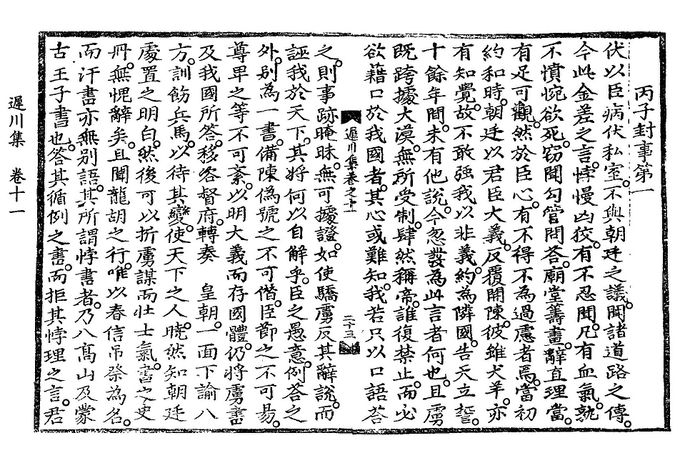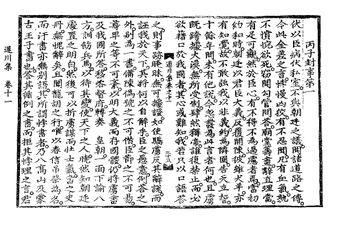(Translation) 崔鳴吉 丙子封事第一
| Primary Source | ||
|---|---|---|
 |
Title | |
| English | ||
| Chinese | 丙子封事第一 | |
| Korean(RR) | 병자봉사제일(Byeongjabongsajeil) | |
| Text Details | ||
| Genre | Literati Writings | |
| Type | 箚 | |
| Author(s) | 崔鳴吉 | |
| Year | ||
| Source | Korean Classics and Literati's Collection of Writings (한국고전종합DB) | |
| Key Concepts | ||
| Translation Info | ||
| Translator(s) | Participants of 2019 JSG Summer Hanmun Workshop (Advanced Translation Group) | |
| Editor(s) | ||
| Year | 2019 | |
목차
Introduction
Original Script
| Classical Chinese | English |
|---|---|
|
伏以臣病伏私室。不與朝廷之議。聞諸道路之傳。今此金差之言。悖慢凶狡。有不忍聞。凡有血氣。孰不憤惋欲死。竊聞句管問答。廟堂籌畫。辭直理當。有足可觀。然於臣心。有不得不爲過慮者焉。當初約和時。朝廷以君臣大義。反覆開陳。彼雖犬羊。亦有知覺。故不敢強我以非義。約爲隣國。告天立誓。十餘年間。未有他說。今忽發爲此言者何也。且虜旣跨據大漠。無所受制。肆然稱帝。誰復禁止。而必欲藉口於我國者。其心或難知。 我若只以口語答之。則事跡晻昧。無可據證。如使驕虜反其辭說。而誣我於天下。其將何以自解乎。臣之愚意。例答之外。別爲一書。備陳僞號之不可僭。臣節之不可易。尊卑之等不可紊。以明大義而存國體。仍將虜書及我國所答。移咨督府。轉奏皇朝。一面下諭八方。訓飭兵馬。以待其變。使天下之人。曉然知朝廷處置之明白。然後可以折虜謀而壯士氣。書之史冊。無愧辭矣。且聞龍胡之行。唯以春信弔祭爲名。而汗書亦無別語。其所謂悖書者。乃八高山及蒙古王子書也。 答其循例之書。而拒其悖理之言。君臣之義。隣國之道。得以兩全。於計爲宜。況今山陵未畢。守備未完。權宜緩禍之策。亦何可全然不思。金差不妨招見。所不可見者西㺚耳。西㺚不必薄待。所當嚴斥者悖書耳。 臣竊觀今日虜情。特有早晩。等是被兵。但不可矇矓處置。以致見賣。過於落莫。以促其兵耳。城門閉言路開。雖有悔端。亦不濟事。今日之勢可謂急矣。而幸未至於目前被兵。伏願殿下。益加憤發。先立大志。如頃日諫臣筵臣之言。多所採納。收敍言事之臣。勇革病民之政。振拔人才。激勵將士。以慰臣民之望。則人心旣悅。國勢自固。雖有外患。亦不至大段顚沛矣。臣之賤疾。一向沈綿。精神昏憒。全不省外事。而竊不任區區憂國之誠。冒陳所懷。唯明主裁之。取進止。 |
(translation) |
Discussion Questions
Further Readings
References
丙子封事[第二] http://db.itkc.or.kr/dir/item?itemId=MO#/dir/node?dataId=ITKC_MO_0328A_0110_010_0130
丙子封事[第三] http://db.itkc.or.kr/dir/item?itemId=MO#/dir/node?dataId=ITKC_MO_0328A_0110_010_0140
Translation
(sample) : Jaeyoon Song
- Discussion Questions:
Student 1 : (Write your name)
- Discussion Questions:
'Student 2 : Samuel Sai Hay Chan 陳世熙 진세희"
- Discussion Questions: What is the historical context in which this memorial was written? What did the memorial tell us about Choson-Qing relation in the 1630s? Why was the Choson-Qing relation like this? Previous scholars have attributed Choson's cultural prejudice against the Jurchen-cum-Manchurians as a main cause of an antagonistic relation between Choson and Qing. What about the causes in the political-economy?
Student 3 : Younès M'Ghari
- Discussion Questions:
- Is the concept of "closing the gates and opening the channels of expression" something typically Korean during the Yi dynasty? If not, was is also existing in China and Koryô?
- Did the Chosôn court really think that it was the most "civilized" among the "barbarians" around China?
Student 4 : King Kwong Wong
- Discussion Questions:
Student 6 : Stacey Lui
- Discussion Questions:
Student 8 : Q
- Discussion Questions:
Who was Ch'oe Myŏngkil (Choe Myeonggil)? Considering the situation of the Chosŏn (Joseon) in the 17th century, what were the factors that influenced his writing?
